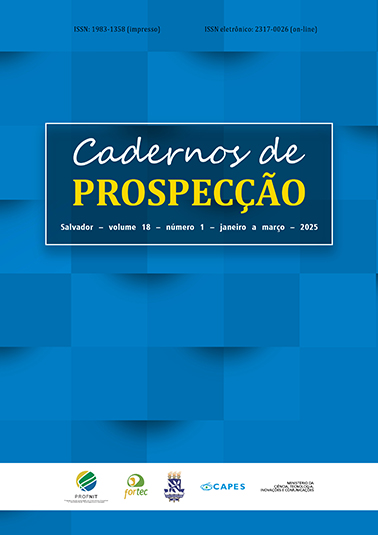Social Innovation Through Knowledge Transfer: strategies, challenges and impacts
DOI:
https://doi.org/10.9771/cp.v18i1.60571Keywords:
Collaboration, Knowledge Sharing, Social TransformationAbstract
The aim of this study is to comprehend the phenomenon of knowledge and technology transfer in the context of social innovation, highlighting key strategies, challenges faced, and observed impacts. It refers to an exploratory and descriptive research based on an integrative review of studies published in the Web of Science database. Eight articles that meet the research objective have been selected. The majority of the analyzed articles present case studies in which Higher Education Institutions play a central role, utilizing public engagement strategies through projects, programs, courses, and workshops. Among the challenges faced in the transfer of knowledge to promote social innovation are university culture, difficulties in engaging social actors, bureaucratic structure, and the measurement of social value. However, the positive impacts are diverse, including the generation of social and economic value, such as income generation, employment, and profitability in businesses.
Downloads
References
CARAYANNIS, E. G. et al. Social Business Model Innovation: A Quadruple/Quintuple Helix-Based Social Innovation Ecosystem. IEEE Transactions on Engineering Management, [s.l.], v. 68, n. 1, p. 235-248, 2021. Disponível em: https://ieeexplore.ieee.org/document/8720229/. Acesso em: 13 jun. 2023.
CORTESE, D. et al. Transformative social innovation in developing and emerging ecosystems: a configurational examination. Review of Managerial Science, [s.l.], p. 19, 2023. Disponível em: https://link-springer-com.ez52.periodicos.capes.gov.br/article/10.1007/s11846-023-00624-1. Acesso em: 14 out. 2023.
FISCHER, B. et al. Knowledge transfer for frugal innovation: where do entrepreneurial universities stand? Journal of Knowledge Management, [s.l.], v. 25, n. 2, p. 360-379, 2021. Disponível em: https://www.emerald.com/insight/content/doi/10.1108/JKM-01-2020-0040/full/html. Acesso em: 6 dez. 2023.
GIL, A. C. Como elaborar projetos de pesquisa. 4. ed. São Paulo: Atlas, 2002.
KRIPA, D. et al. New Business Education Model for Entrepreneurial HEIs: University of Tirana Social Innovation and Internationalization. Administrative Sciences, [s.l.], v. 11, n. 4, p. 122, 2021. Disponível em: https://www.mdpi.com/2076-3387/11/4/122. Acesso em: 15 out. 2023.
MATOS, L. M. M. et al. Innovación social: un análisis bibliométrico del concepto y sus tendencias actuales. Revista Universidad y Empresa, [s.l.], v. 23, n. 41, p. 1-27, 2021. Disponível em: https://revistas.urosario.edu.co/index.php/empresa/article/view/8964. Acesso em: 15 out. 2023.
MENTER, M. From technological to social innovation: toward a mission-reorientation of entrepreneurial universities. The Journal of Technology Transfer, [s.l.], p. 18, 2023. Disponível em: https://link-springer-com.ez52.periodicos.capes.gov.br/article/10.1007/s10961-023-10002-4. Acesso em: 14 out. 2023.
MIRVIS, P. et al. Corporate social innovation: How firms learn to innovate for the greater good. Journal of Business Research, [s.l.], v. 69, n. 11, p. 5.014-5.021, 2016. Disponível em: https://linkinghub.elsevier.com/retrieve/pii/S0148296316302363. Acesso em: 6 dez. 2023.
RAMÍREZ, O. J. G.; MOLANO, H. P.; ACOSTA, C. C. S. Aportes al diseño multiactor de políticas públicas BOTTOM-UP. Análisis comparado de experiencias de innovación social para la paz desde la academia. Opera, [s.l.], n. 31, p. 47-69, 2022. Disponível em: https://revistas.uexternado.edu.co/index.php/opera/article/view/7869/12629. Acesso em: 15 out. 2023.
RASHID, N. K. A. et al. Community Engagement and Social Innovation Through Knowledge Transfer: Micro Evidence from Setiu Fishermen in Terengganu, Malaysia. Journal of the Knowledge Economy, [s.l.], p. 6, 2023. Disponível em: https://link.springer.com/10.1007/s13132-023-01102-5. Acesso em: 14 out. 2023.
RAUPELIENĖ, A. et al. Conceptual outlook to social innovation in EU. In: PROCEEDINGS OF THE 7th INTERNATIONAL SCIENTIFIC CONFERENCE RURAL DEVELOPMENT 2015, Aleksandras Stulginskis University, 2015. p. 7. Anais [...]. Aleksandras Stulginskis University, 2015. Disponível em: https://hdl.handle.net/20.500.12259/110913. Acesso em: 3 set. 2023.
SCHMIDT, S.; STADERMANN, J. Innovation Salons – Events for dialogical knowledge transfer between civil society and higher education institutions. Local Economy: The Journal of the Local Economy Policy Unit, [s.l.], v. 37, n. 6, p. 526-538, 2022. Disponível em: https://journals-sagepub-com.ez52.periodicos.capes.gov.br/doi/10.1177/02690942231165920. Acesso em: 14 out. 2023.
SOUZA, M. T.; SILVA, M. D.; CARVALHO, R. Integrative review: what is it? How to do it? Einstein, São Paulo, v. 8, n. 1, p. 102-106, 2010. Disponível em: http://www.scielo.br/scielo.php?script=sci_arttext&pid=S1679-45082010000100102&lng=en&tlng=en. Acesso em: 12 jul. 2023.
ŠPAČEK, M. et al. The role of knowledge in supporting the revitalisation of traditional landscape governance through social innovation in Slovakia. Environmental Policy and Governance, [s.l.], v. 32, n. 6, p. 560-574, 2022. Disponível em: https://onlinelibrary-wiley.ez52.periodicos.capes.gov.br/doi/10.1002/eet.2026. Acesso em: 14 out. 2023.
UNCETA, A.; GUERRA, I.; BARANDIARAN, X. Integrating Social Innovation into the Curriculum of Higher Education Institutions in Latin America: Insights from the Students4Change Project. Sustainability, [s.l.], v. 13, n. 10, p. 5.378, 2021. Disponível em: https://www.mdpi.com/2071-1050/13/10/5378. Acesso em: 15 out. 2023.
ŽIČKIENĖ, S.; TAMOŠIŪNAS, T. Social innovation concept and implementation in the European Union and in the Republic of Lithuania. Social Welfare: Interdisciplinary Approach, [s.l.], v. 8, n. 1, p. 42-58, 2018. Disponível em: https://www.journals.vu.lt/social-welfare/article/view/28104. Acesso em: 5 jul. 2023.
Downloads
Published
How to Cite
Issue
Section
License
Copyright (c) 2024 Cadernos de Prospecção

This work is licensed under a Creative Commons Attribution-NonCommercial 4.0 International License.
O autor declara que: - Todos os autores foram nomeados. - Está submetendo o manuscrito com o consentimento dos outros autores. - Caso o trabalho submetido tiver sido contratado por algum empregador, tem o consentimento do referido empregador. - Os autores estão cientes de que é condição de publicação que os manuscritos submetidos a esta revista não tenham sido publicados anteriormente e não sejam submetidos ou publicados simultaneamente em outro periódico sem prévia autorização do Conselho Editorial. - Os autores concordam que o seu artigo ou parte dele possa ser distribuído e/ou reproduzido por qualquer forma, incluindo traduções, desde que sejam citados de modo completo esta revista e os autores do manuscrito. - Revista Cadernos de Prospecção está licenciado com uma Licença Creative Commons Attribution 4.0. Esta licença permite que outros remixem, adaptem e criem a partir do seu trabalho para fins não comerciais, e embora os novos trabalhos tenham de lhe atribuir o devido crédito e não possam ser usados para fins comerciais, os usuários não têm de licenciar esses trabalhos derivados sob os mesmos termos.
Este obra está licenciado com uma Licença Creative Commons Atribuição 4.0 Internacional.








